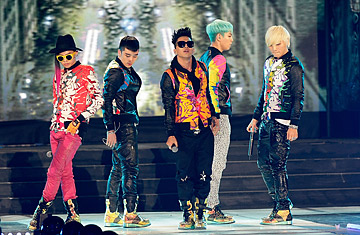
South Korean idol group Big Bang perform on the stage during a concert at the K-POP Fashion Concert on March 11, 2012 in Seoul.
Popova is surrounded by people who also love Big Bang — a lot. Hours before the doors open in Seoul's Olympic Park, thousands line up to watch the band kick off its first world tour. Middle-aged Japanese women mingle with fans from China and Europe under a massive placard featuring the band members' gorgeously proportioned — and frozen — faces. The concept behind the Alive Tour is that Big Bang has been locked in ice for 85 million years (yes, 85 million), waiting for 2012, the year the world is finally ready to fall in love with a Korean band.
It's a prescient story line. After years of being written off as froth, Korean pop, or K-pop, is getting the global attention it craves. Groups like Big Bang, 2NE1 and Girls' Generation are selling out stadiums from Jakarta to New York City. Their videos clock billions of hits in dozens of countries. Rapper Psy's tongue-in-cheek video for "Gangnam Style" has drawn over 100 million views on YouTube, at once poking a hole in Seoul's glossy music culture and becoming its most celebrated export. By the end of August, the song had hit No. 44 on the U.S. iTunes Top 100. Music website AllKPop.com called it "the greatest advancement by a Korean artist in all of history."
The breakthrough has been a long time coming. Since the mid-1990s, South Korean entertainment companies have been churning out stars whose crackling dance moves, pitch-perfect melodies and studied street fashion are wildly popular in Asia. Past attempts to break into non-Asian markets have usually fizzled. But in Paris, 14,000 tickets for two K-pop shows in June 2011 sold out in minutes. The sight of French teenagers in front of the Louvre baying for a second show caught everyone by surprise — and sent music executives scrambling. Yongbae Cho, managing director of the Seoul office of Live Nation, which is promoting Big Bang's tour, says fans now sprout up everywhere. "Why am I getting letters from Argentina?" he recalls wondering. "Should we be going there?"
Plenty of Argentine fans would like nothing more. Though almost all K-pop is sung in Korean, the songs are as irresistible in Buenos Aires as they are in Kuwait. That's partly because South Korean entertainment companies have made an art of whipping up international hype for the stars they debut on an almost weekly basis. It's also because of a greater acceptance of South Korean products in general. A decade ago, you weren't reading this on your Samsung Galaxy or cruising in your Hyundai. But these days, "anything that has a Korean stamp on it — from frozen yogurt to soju to sporty cars — it's not so foreign anymore," says Bernie Cho, president of DFSB Kollective, a Seoul-based K-pop agency. And that's helping K-pop be experienced not just as South Korean music but as music, period. No other form of Asian music — neither J-pop (Japanese pop) nor Cantopop (the music of Cantonese-speaking Hong Kong) — has made that leap.
The Korean Way
It's no coincidence that one of pop's hottest scenes emanates from the nation with the best wireless access on earth. K-pop bands may not be charting on Billboard, but that hardly matters. South Koreans watch more YouTube on their handsets than on their laptops, a higher percentage than any other country. K-pop is disseminated accordingly. Last year, YouTube users in 235 countries generated 2.3 billion hits watching K-pop videos from Korea's top three entertainment companies, driving a digital demand that pushed South Korea's music market up 6% in the first half of 2011, according to the International Federation of the Phonographic Industry. In 2005, South Korea was the world's 33rd largest music market. Today it's the 11th.
South Korean music-industry exports shot from $31.3 million in 2009 to $83.3 million in 2010, according to official figures. The business has not been immune to the slowing sales plaguing the global music industry, but then less than half the revenue of South Korea's big entertainment companies — which handle everything from recruiting talent to shifting albums to booking concerts — comes from sales, says Joon Ahn, senior vice president of showbiz giant CJ Entertainment & Media. Most is generated by things like merchandising, appearance fees and concerts. These diversified revenue streams have allowed K-pop to thrive, and insiders say the industry is in a better position than ever. "I never expected to see Korean music go so far so fast," says Bernie Cho.
Credit the Korean work ethic for much of that. K-pop stars are made, not born, graduating from intensive vocal, dance, language and etiquette classes at outfits like SM Entertainment and JYP. Though many artists are not paid well, the perception in the suburban tower blocks of South Korea is that K-pop is a way to get rich quick. Scores of cram schools prepare hopefuls who are auditioning for spots in the K-pop training system. Nearly 2 million applied to be on a recent season of Superstar K, an American Idol-style show that gives its top contestants a shot at the industry, says Lee Seom of CJ Entertainment & Media. "Not everyone is going to make it."
